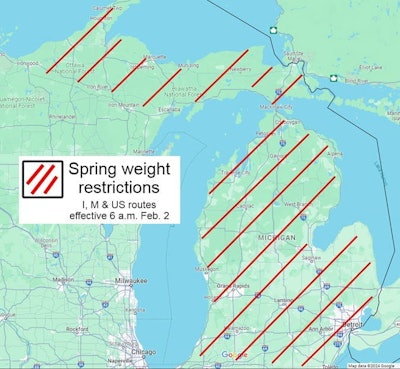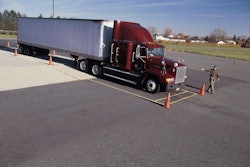Trucking news and briefs for Monday, Feb. 5, 2024:
Women in Trucking calls for input on gender diversity
The Women in Trucking Association (WIT) is encouraging companies in transportation to complete its annual survey on gender diversity in the industry.
The data will be used to develop this year’s WIT Index, the official industry barometer to regularly benchmark and measure the percentage of women who serve in the range of roles across the transportation sector, including professional drivers, corporate positions, and leadership roles.
WIT is requesting for-hire trucking companies, private fleets, transportation intermediaries, railroads, ocean carriers, equipment manufacturers, technology companies and other providers throughout the transportation sector, to report the percentage of women in various roles within their workforce. Interested participants can report their data via the live survey through April 1.
Participating companies in the survey will receive an executive summary of the 2024 WIT Index at no cost, which will enable them to benchmark their gender diversity practices against other companies in transportation.
“Since 2016, when the Women in Trucking Association first launched the WIT Index, the percentages of women in key roles within the industry have been steadily rising,” said Jennifer Hedrick, president and CEO of WIT. “We created the WIT index to monitor the industry’s progress in gender diversity among all roles, including corporate leaders and supervisors, drivers, technicians, safety directors and human resources. Maximum participation by companies involved in trucking is critical to the success of this vital research.”
Last year, the 2023 WIT Index survey found a substantial number of women in leadership roles. Approximately 31.6% of women are in C-Suite/executive positions, 36.9% are in supervisory leadership roles, and 28.4% serve on boards of directors. In addition, the WIT Index found that among the participants 12.1% of all professional drivers are women.
[Related: Survey finds fewer women in commercial driver positions]
Michigan’s annual ‘frost law’ weight restrictions now in effect
 The Michigan DOT has imposed and is enforcing weight restrictions on all state trunkline highways in the entire state.MDOT
The Michigan DOT has imposed and is enforcing weight restrictions on all state trunkline highways in the entire state.MDOT
The Michigan Department of Transportation (MDOT) and local agencies are enacting spring weight restrictions, commonly referred to as “frost laws,” an annual move to protect roads.
Effective 6 a.m. Friday, Feb. 2, weight restrictions have been imposed and enforced on all state trunkline highways in the entire state. All state trunklines will have weight restrictions imposed and enforced. State routes typically carry M, I, or US designations.
When roads that have been frozen all winter begin to thaw from the surface downward, melting snow and ice saturate the softened ground. During the spring thaw, the roadbed softened by trapped moisture beneath the pavement makes it more susceptible to damage. This contributes to pothole problems already occurring due to this winter's numerous freeze-thaw cycles.
In the restricted areas, the following will apply:
On routes designated as "all-season" (designated in green and gold on the MDOT Truck Operators Map), there will be no reduction in legal axle weights.
All extended permits will be valid for oversize loads in the weight-restricted area on the restricted routes. Single-trip permits will not be issued for any overweight loads or loads exceeding 14 feet in width, 11 axles, and 150 feet in overall length on the restricted routes.
On routes designated as "seasonal" (designated in solid or dashed red on the MDOT Truck Operators Map), there will be a posted weight reduction of 25% for rigid (concrete) pavements and 35% for flexible (asphalt) pavements, and maximum speed of 35 mph for some vehicles.
Drivers must follow the speed limits for weight restricted roads, per state law.
MDOT determines when weight restrictions begin each spring by measuring frost depths along state highways, observing road conditions, and monitoring weather forecasts. Weight restrictions remain in effect until the frost line is deep enough to allow moisture to escape and the roadbeds regain stability.
County road commissions and city public works departments put in place their own seasonal weight restrictions, which usually, but not always, coincide with state highway weight restrictions. Signs are generally posted to indicate which routes have weight restrictions in effect.
Diesel shop employee sentenced in ongoing emissions ‘delete’ case
Dustin Rhine, who was an employee of the Diesel Freak truck shop, has been sentenced to 12 months of probation, a $2,000 fine and a $100 special assessment for his role in a scheme to disable emissions control systems on trucks, according to the Department of Transportation Office of Inspector General.
Rhine had previously pleaded guilty to conspiracy to violate the Clean Air Act. In April 2023, Rhine was charged along with 10 other individuals and 3 companies for their involvement in a scheme to disable the emissions controls on hundreds of semi-trucks. Tampering with or removing emissions controls can drastically increase the emissions of nitrogen oxides, particulate matter, carbon monoxide, and non-methane hydrocarbons found in vehicle exhaust, OIG said.
In September and October 2023, seven individuals and two companies were sentenced for the scheme.
[Related: Another individual pleads guilty in emissions ‘delete’ case]











